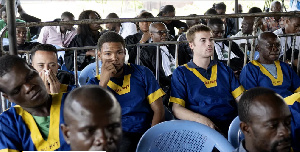- Home - News
- Polls
- Year In Review
- News Archive
- Crime & Punishment
- Politics
- Regional
- Editorial
- Health
- Ghanaians Abroad
- Tabloid
- Africa
- Religion
- Election 2020
- Coronavirus
- Photo Archives
- News Headlines
- Press Release
Press Releases of Friday, 16 June 2023
Source: Commission on Human Rights and Administrative Justice (CHRAJ)
Commemoration of the Day of the African Child: ‘The Rights of the Child in the Digital Environment’
The Commission on Human Rights and Administrative Justice (CHRAJ) stands in unity with children in Ghana and on the African continent to celebrate this year's Day of the African Child (DAC).
The Commission, this day, calls for sustained efforts and commitment by the State and all relevant stakeholders to make realistic commitments towards the realisation of children's rights in the digital environment.
The DAC came into effect in 1991 through the Assembly of Heads of State and Government of the then Organization of African Unity (OAU). This was in memory of students massacred and injured during the 16th of June 1976 student uprising in Soweto, South Africa who were marching in demand for quality education and the need to be taught in their languages.
The theme for this year's commemoration, 'The Rights of the Child in the Digital Environment'; is focused on encouraging member states to ensure the protection and promotion of children's rights in the digital environment.
The internet serves as a great tool for the development of children into global citizens. It provides the opportunity to help realise the rights and freedoms of children such as the right to education, right to play, freedom of association, freedom of expression among others.
The COVID-19 pandemic showed how access to the internet could be utilized to ensure the continuation of the enjoyment of these rights. However, a 2020 UNICEF report revealed that as little as 1% of children living in the poorest quintiles of West and Central Africa have access to the Internet.
On the other hand, access to the internet also provides risks for children. These risks include child trafficking, cyber-bullying, identity theft and online child
sexual exploitation and abuse. In Ghana, children start using the internet at an average age of 12 years. Also, one in three children in the country uses the internet at least every week, either at home or through inexpensive, easily available smartphones. Majority of these children (about 7 in 10) use the internet to learn, connect with friends and create online content, making many of them susceptible to harmful and abusive content.
Alarmingly, Ghana has seen a steady rise in the cases of online child sexual exploitation and abuse (OCSEA) or abuse that is assisted by technology. A report from the National Centre for Missing and Exploited Children indicated that more than 13,000 images and videos of child sexual abuse were accessed or uploaded from Ghana in 2020.
A more recent survey by the Cyber Security Authority in February 2022, revealed that 2331 out of 3600 school children interviewed had received sexual content online with the same number of them having met a stranger they had first met online physically. Also, 1418 had experienced romance scams, 862 had been scammed and required to provide sex. Some of these children, 830 of them admitted to posting sexual content and material to someone online, and 769 had been cyberbullied.
The Commission recognises existing national legislation, regulations and policies to help protect children from online exploitation and abuse. These include the Children's Act, 1998 (Act 560), the Cybersecurity Act, 2020 (Act 1038) and the establishment of the Cyber Security Authority (CSA) with the mandate to regulate cybersecurity activities, including providing technical support for law enforcement agencies to prosecute cyber offenders and to ensure child online protection in Ghana.
Also, there is the National Child Online Protection Framework, a revised National Cyber Security Policy and Strategy and an incident-reporting portal that allows victims to report online abuse set up at the CSA. In addition, Ghana launched the Internet Watch Foundation Reporting Portal for the removal and reporting of child sexual abuse material being accessed from Ghana but hosted outside the country.
In 2018, the Ministry of Communication and Digitalisation through the National Cyber Security Centre launched Ghana's National Cyber Security Awareness Programme (2019-2024) dubbed, 'A Safer Digital Ghana' to raise awareness on cybercrimes and the need to improve Ghana's security readiness among relevant stakeholders.
Some of the interventions under this programme are aimed at ensuring that digital technologies are not misused to facilitate sexual exploitation and abuse of children while empowering children to use digital technologies in a way that is free from bullying and harassment.
Internationally, Ghana has ratified both the Convention on Cybercrime (Budapest Convention) and the African Union Convention on Cyber Security and Data Protection (Malabo Convention), two major treaties aimed at addressing the international dimensions of cyber-related threats.
Although, the Commission commends the state on the strengthening of Ghana's legal and policy regime to address OCSEA, the rising number of online abuse and exploitation targeted at children is worrisome.
Thus, the Commission calls on government and relevant stakeholders including the Ministry of Gender, Children and Social Protection, the Ministry of Communication and Digitalisation, the National Cyber Security Authority and the Data Protection Commission to streamline efforts towards the strengthening of the implementation of laws and policies geared towards making the internet safer for children in Ghana.
Also, the Commission urges government to consolidate the capacity of the workforce of law enforcement agencies like the Criminal Investigations Department of the Ghana Police Service to facilitate investigations and gather solid evidence to prosecute criminals towards combatting online child sexual exploitation and abuse.
Lastly, the government is entreated to work towards the realization of Sustainable Development Goal 16.2 focused on protecting children from abuse, exploitation, trafficking and violence and to ratify the Optional Protocol to the Convention on the Rights of the Child on the Sale of Children, child prostitution and child pornography.











